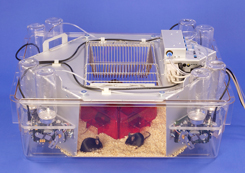Institute of Anatomy UZH and IBWS ETH Zurich
![]()
Research projects
My researcdh group is no longer active. We investigated the biological basis of cognitive function in the normal and diseased brain. We worked with animal models, combining the analysis of behavior with functional and comparative neuroanatomy, stereotactic lesions, and – in collaboration with other labs – molecular genetic approaches. We also investigated the influence of genetic variation, age, environment and life style on cognitive function and the underlying brain circuitry.
We conttributed to the training activities of the ZNZ and ZIHP, regularly accepted guest scientists and contributed to international shools and courses. In 2001, 2003 and 2011, we organized EMBO Practical Courses on Mouse Phenotyping in Zurich. In 2016 and 2019, we contributed to the Baltic summer school on behavioural characterization of rodent models of major brain disorders in Pyhajärve, Estonia.

My reesearch group was particularly interested in improving the analysis of mouse behavior.
Thanks to the rapid development of molecular genetics, mouse models were used on a large scale to study molecular and cellular mechanisms of cognitive function and psychiatric diseases. Analysis of behavior was (and still is) indispensable to fully exploit the potential of these models but was facing a number of challenges:
![]() approaches to behavioral phenotyping lacked the efficiency and throughput needed to
approaches to behavioral phenotyping lacked the efficiency and throughput needed to
![]() keep pace with the rapidly growing number of mouse models being created
keep pace with the rapidly growing number of mouse models being created
![]() there was a rising general concern about the reproducibility of research results, and behavioral
there was a rising general concern about the reproducibility of research results, and behavioral
![]() analysis of mouse models was regarded as one of the most worrisome areas
analysis of mouse models was regarded as one of the most worrisome areas
![]() the validity of several mouse models had been questioned due to failure to translate
the validity of several mouse models had been questioned due to failure to translate
![]() preclinical results into clinical applications
preclinical results into clinical applications
![]() awareness of animal welfare issues was increasing, in particular regarding the adverse
awareness of animal welfare issues was increasing, in particular regarding the adverse
![]() consequences of stimulus deprivation and social isolation on the wellbeing of rodents
consequences of stimulus deprivation and social isolation on the wellbeing of rodents
In order to address these challenges, we
![]() improved the validity of existing behavioral tests by adapting our test battery to specific needs
improved the validity of existing behavioral tests by adapting our test battery to specific needs
![]() and behavioral repertoire of mice and by extracting more meaningful behavioral parameters
and behavioral repertoire of mice and by extracting more meaningful behavioral parameters
![]() developed the IntelliCage system for automated multidimensional assessment of mouse
developed the IntelliCage system for automated multidimensional assessment of mouse
![]() behavior in a social home cage setting. This increased throughput, optimized welfare and
behavior in a social home cage setting. This increased throughput, optimized welfare and
![]() improved reproducibility by minimizing effects of lab environment and handling by humans.
improved reproducibility by minimizing effects of lab environment and handling by humans.
![]() designed new approaches to data analysis exploiting the free statistical software environment
designed new approaches to data analysis exploiting the free statistical software environment
![]() R-project in order to increase efficiency and reduce observer bias
R-project in order to increase efficiency and reduce observer bias